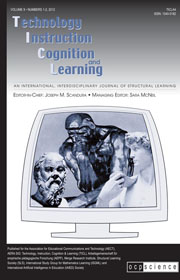 TICL Home · Issue Contents · Editorial Board
TICL Home · Issue Contents · Editorial Board
Subscription Info · Contributor Notes · Online Submissions · Call for Papers · Recommend
Technology, Instruction, Cognition and Learning
Editor-in-Chief: Joseph M. Scandura
ISSN: 1540-0182 (print)
ISSN: 1540-0174 (online)
80 pages/issue · 6″ x 9″
Issue Coverage: Volume 1 (2003) – Present
Abstracted and Indexed in:
ERIC
Aims and Scope
Technology, Instruction, Cognition and Learning (TICL) is an international, interdisciplinary journal of structural learning – promoting and disseminating interdisciplinary advances in theory and research at the intersection of four focus disciplines: Technology, Instruction, Cognition and Learning. Important developments in both theory and software technologies open a plethora of new opportunities for scientific and technological advance barely foreseen even a few years ago. These opportunities will be realized to the extent that advances can be synthesized to provide more inclusive solutions. To assure that articles build on the state of the art, each will be peer-reviewed by experts in at least two areas.
TICL’s vision is to improve interdisciplinary communication and to promote scientific dialogue on fundamental issues and technological developments having important implications for future advances. TICL seeks articles that address such basic questions as what it means to know something, how best to determine what an individual knows, how humans learn, and how knowledge is influenced through interaction with the outside world. Theory, research and technological innovations leading to automation are especially encouraged.
TICL scope includes: artificial intelligence, cognitive and development psychology, software engineering, cognitive science, structural and task analysis, knowledge engineering, distributed cognition, instructional systems and design, intelligent tutors, structural learning, problem solving and system dynamics. Particular importance is given to scientific and technical contributions that add to current understanding and have practical significance for cognitive, learning and instructional technologies. The goal is to promote work that is cumulative in nature, progressively increasing depth of understanding and the potential (or realization) of automation. Model applications of basic work are also encouraged. Instructional applications of research in other areas (e.g., computational linguistics, discourse theory, logic programming and knowledge modeling) are also relevant.
In addition, TICL publishes articles describing new and/or advanced systems that raise new questions and/or build on, demonstrate or evaluate existing theories. Field of application and age group are not relevant. TICL is equally open to specialized training and school based education; to adult learning and learning in children, even intelligent agents acting individually or collectively in groups.
The editors of TICL invite your contributions.
Limited online access to qualified individuals of this journal is available at: www.TutorITweb.com
